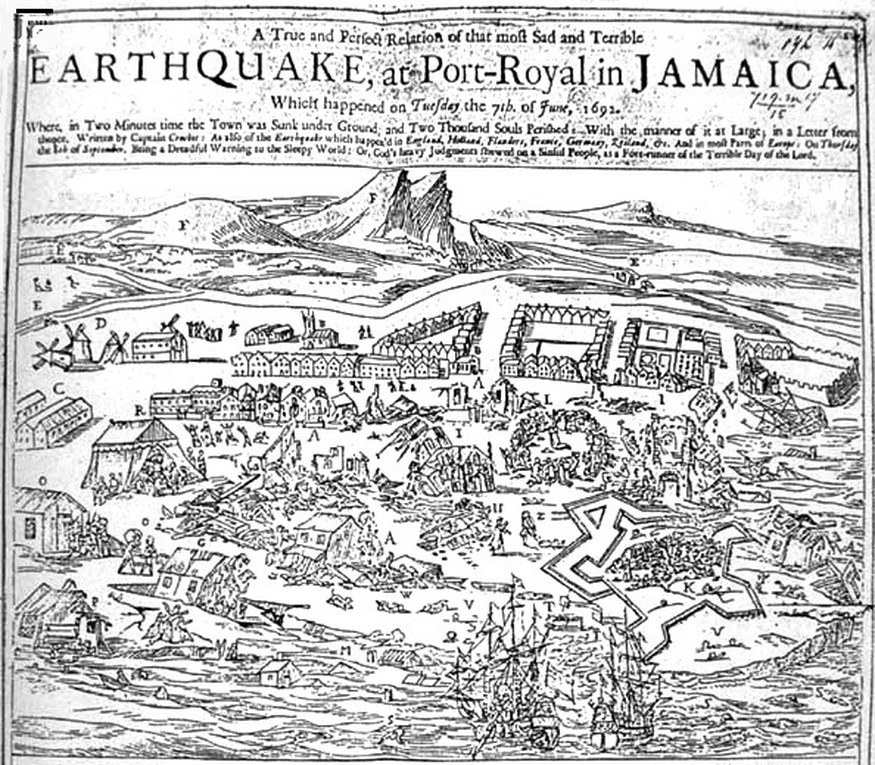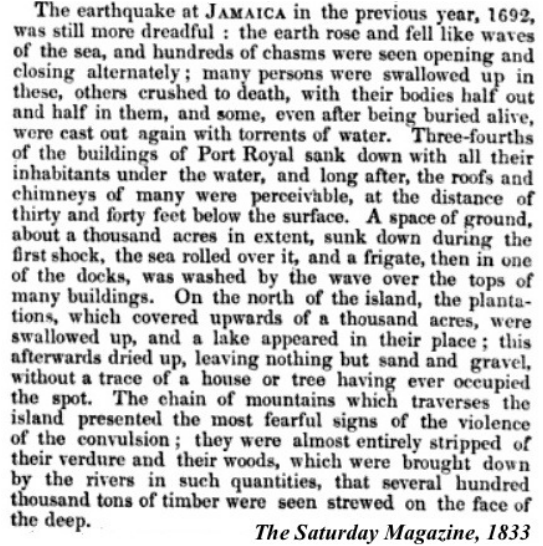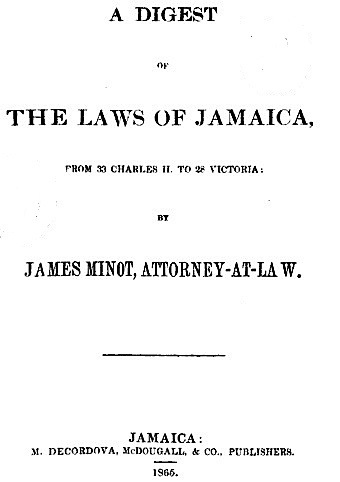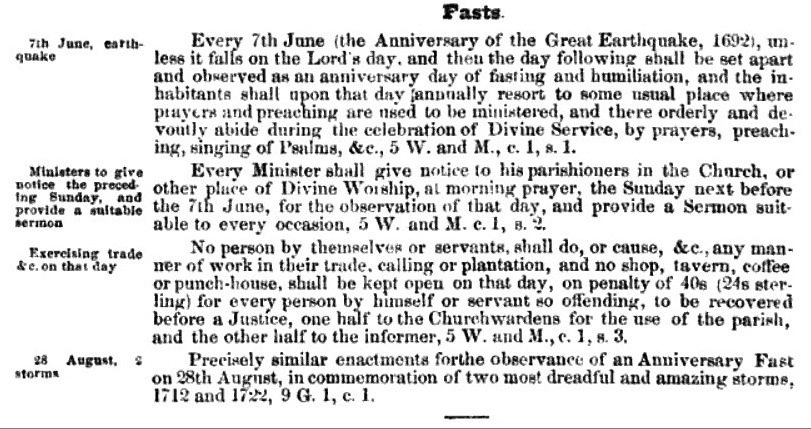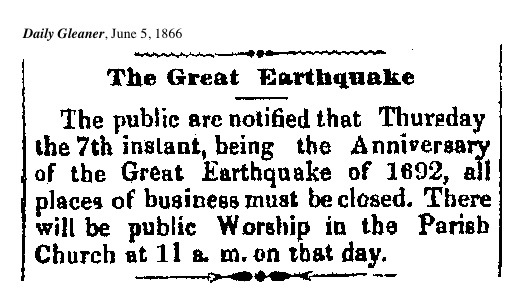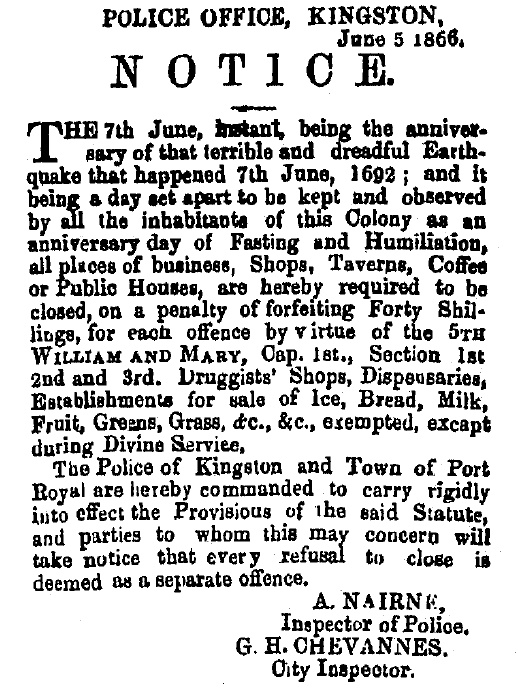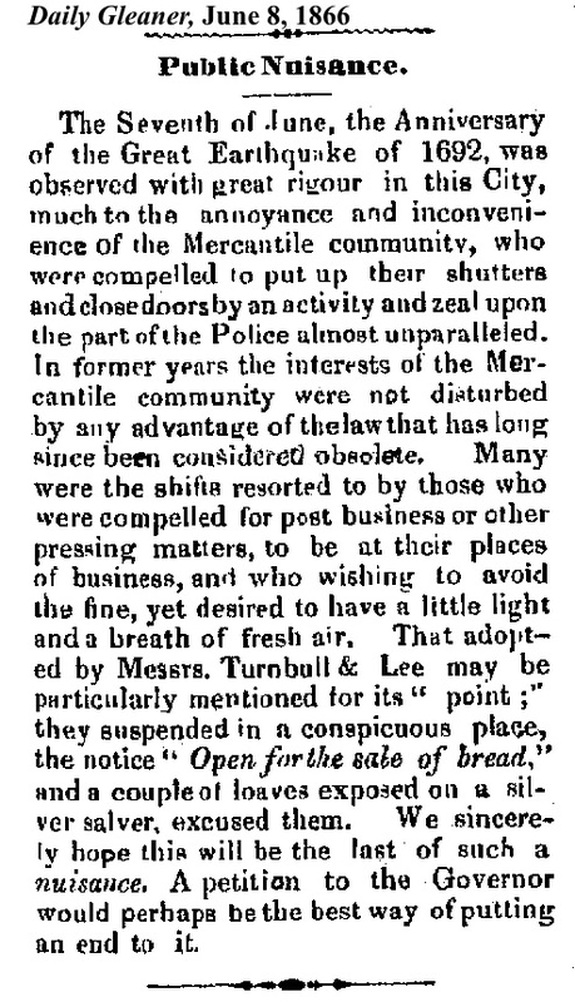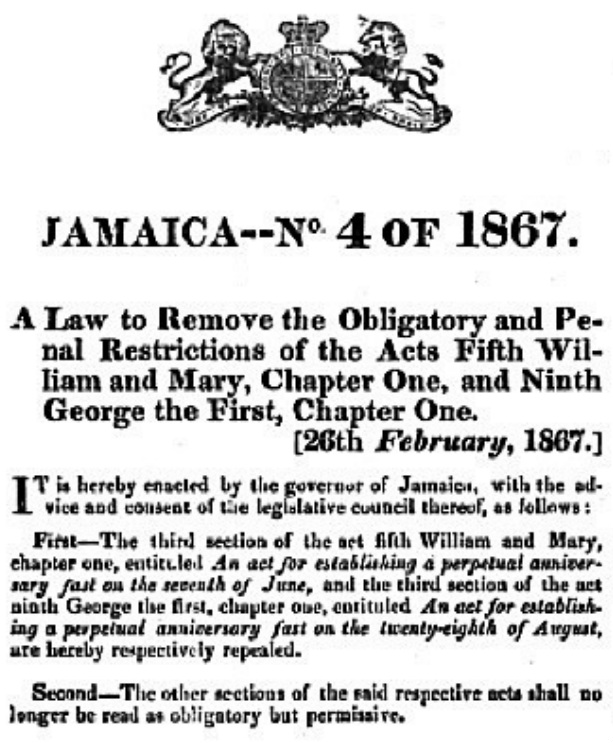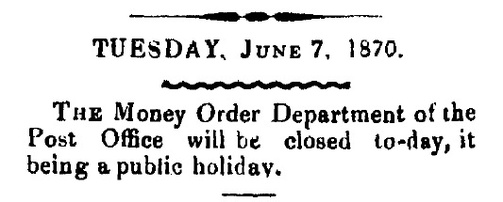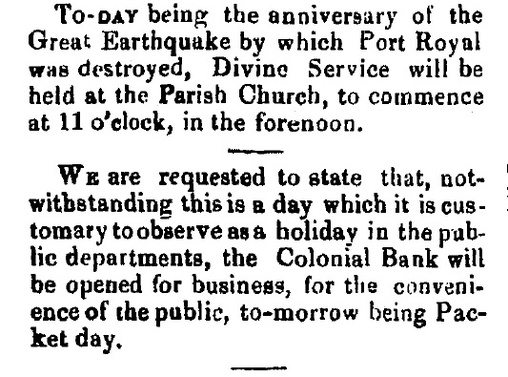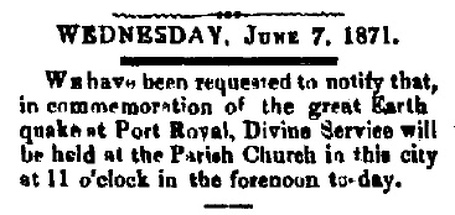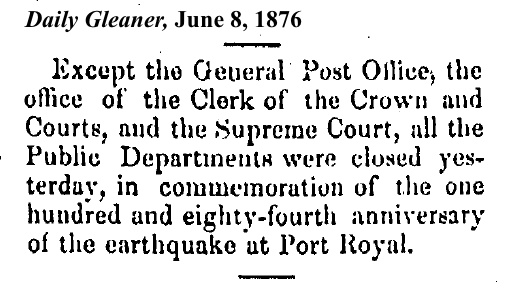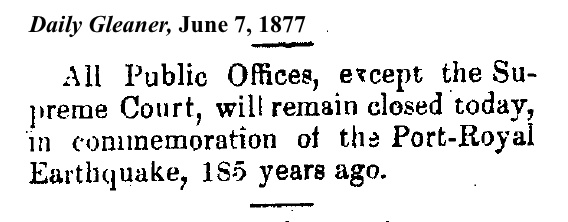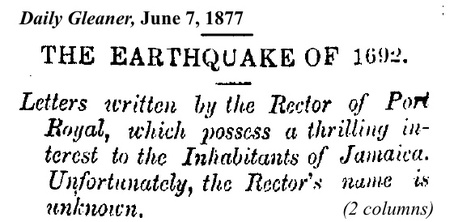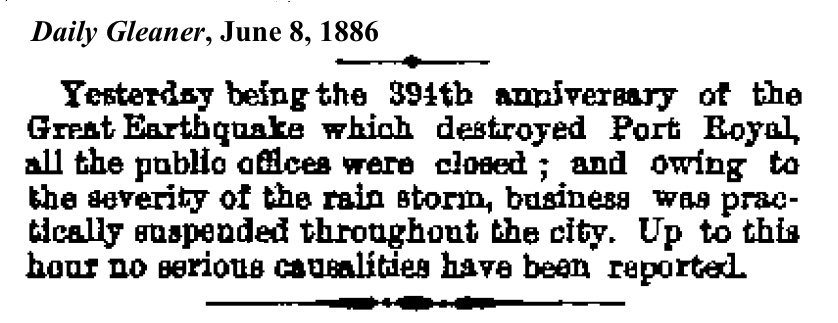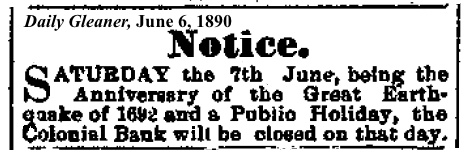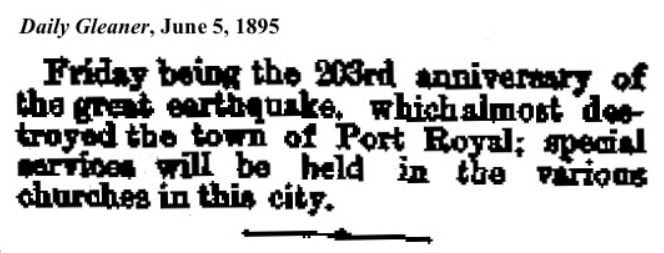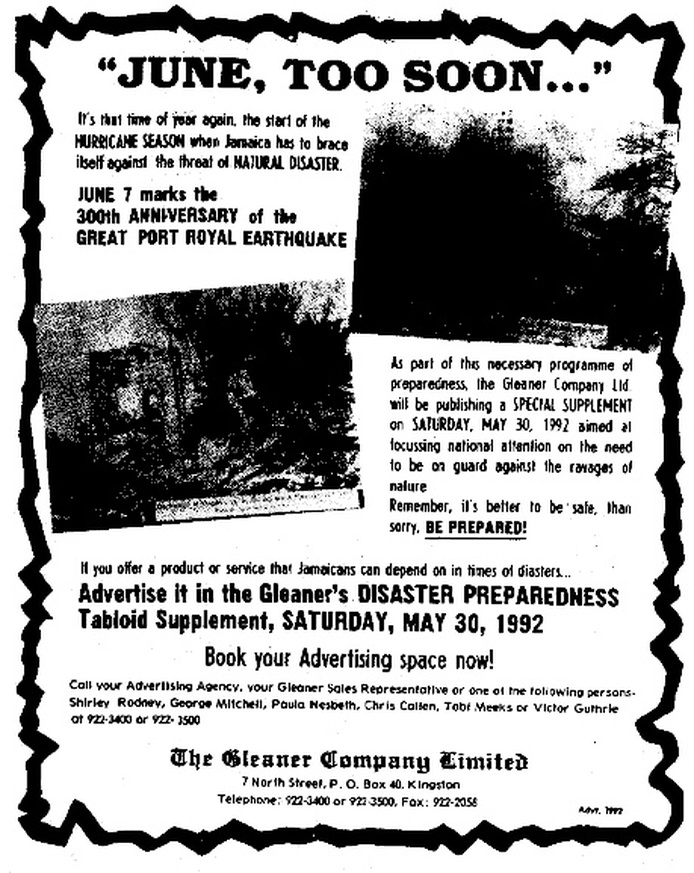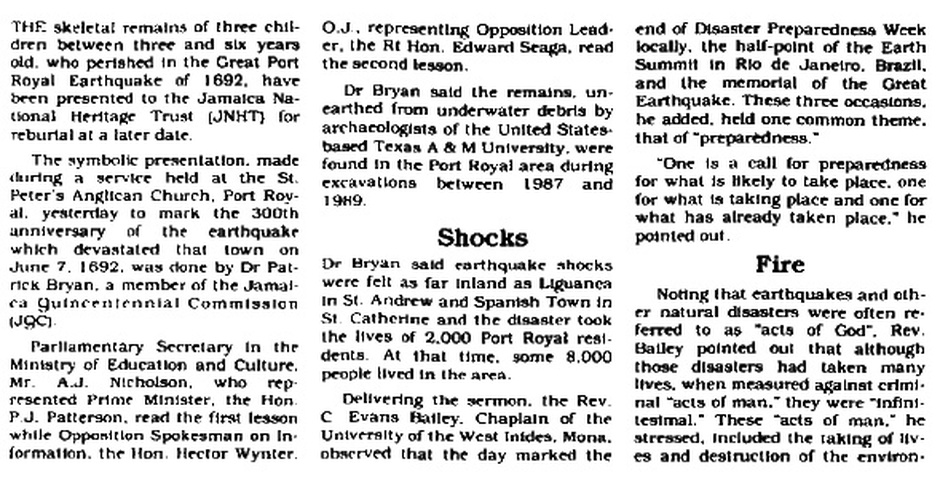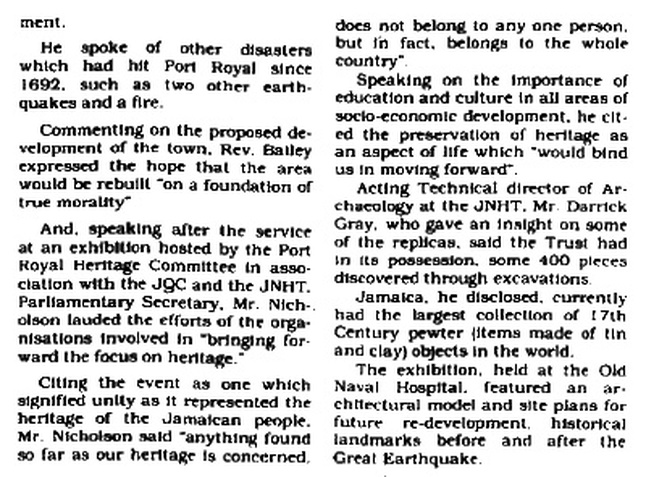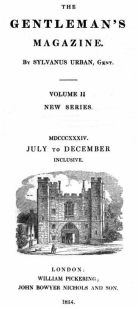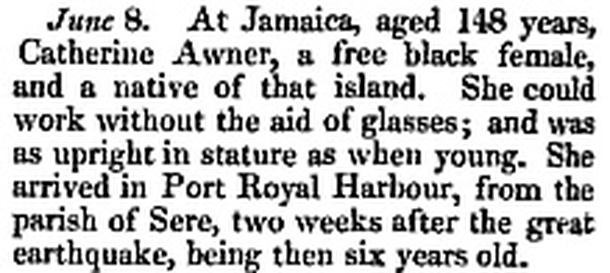June 7 - Great Earthquake 1692
|
The Great Earthquake: Acts of William and Mary.
5 WILLIAM AND MARY, A D 1693, AN ACT FOR ESTABLISHING A PERPETUAL ANNIVERSARY FAST ON THE SEVENTH OF JUNE.
Forasmuch as it hath pleased Almighty God, the Great Creator and Judge of Heaven and Earth, on the seventh day of June, one thousand six hundred ninety-two, justly to punish the inhabitants of this Island for the manifold sins and wickednesses committed against his Divine Majesty, by a most terrible and dreadful Earthquake, which not only laid waste our estates and places of habitation in general, but also destroyed many hundreds of people; which tremendous judgment was succeeded by a raging sickness and mortality, that few or no families escaped: Now that so signal a visitation may be had in perpetual rememberance, and we and our posterity may, by humbling ourselves, endeavour to appease God's imminent wrath and prevent heavier judgments: We, Your Majesty's most dutiful and loyal subjects, Your Majesty's Lieutenant-Governor, Council, and Assembly of this your Island of Jamaica, do-most humbly beseech your most sacred Majesties that it may be enacted, and be it enacted by their Majesties’ Lieutenant-Governor, Council and Assembly, and it is hereby enacted and ordained by the authority of the same, that every seventh day of June (unless it falls out to be on the Lord’s Day, and then the day following) shall be forever hereafter set apart, to be kept and observed by all the inhabitants of this Island as an anniversary day of fasting and humiliation; and that all and every the inhabitants aforesaid shall, upon the said day, annually resort to some usual place where prays and preaching are used to be n[ ]tered, and there orderly and devoutly abide during the celebration of Divine Service by prayers, preaching, singing of psalms, &c.
[No longer to be read as obligatory but permissive, Law 4 1867]
Daily Gleaner, June 7, 1892, p3
5 WILLIAM AND MARY, A D 1693, AN ACT FOR ESTABLISHING A PERPETUAL ANNIVERSARY FAST ON THE SEVENTH OF JUNE.
Forasmuch as it hath pleased Almighty God, the Great Creator and Judge of Heaven and Earth, on the seventh day of June, one thousand six hundred ninety-two, justly to punish the inhabitants of this Island for the manifold sins and wickednesses committed against his Divine Majesty, by a most terrible and dreadful Earthquake, which not only laid waste our estates and places of habitation in general, but also destroyed many hundreds of people; which tremendous judgment was succeeded by a raging sickness and mortality, that few or no families escaped: Now that so signal a visitation may be had in perpetual rememberance, and we and our posterity may, by humbling ourselves, endeavour to appease God's imminent wrath and prevent heavier judgments: We, Your Majesty's most dutiful and loyal subjects, Your Majesty's Lieutenant-Governor, Council, and Assembly of this your Island of Jamaica, do-most humbly beseech your most sacred Majesties that it may be enacted, and be it enacted by their Majesties’ Lieutenant-Governor, Council and Assembly, and it is hereby enacted and ordained by the authority of the same, that every seventh day of June (unless it falls out to be on the Lord’s Day, and then the day following) shall be forever hereafter set apart, to be kept and observed by all the inhabitants of this Island as an anniversary day of fasting and humiliation; and that all and every the inhabitants aforesaid shall, upon the said day, annually resort to some usual place where prays and preaching are used to be n[ ]tered, and there orderly and devoutly abide during the celebration of Divine Service by prayers, preaching, singing of psalms, &c.
[No longer to be read as obligatory but permissive, Law 4 1867]
Daily Gleaner, June 7, 1892, p3
the popular memory of the earthquake by the early 19th century -
and in 1866 observance was still obligatory -
and the activities of the police in enforcing observance were far from appreciated -
|
and in the Packet Edition -
The Gleaner
Saturday, JUNE 23, 1866 Our Packet Summary. Several Merchants of this city were fined 24s. and costs each, by the Sitting Magistrates for not closing their places of business on the 7th inst., the anniversary of the Great Earthquake of 1692. The law has long been considered obsolete; and considerable indignation was expressed at the attempt to enforce it. It is pretty confidently hoped, however, that His Excellency the Governor will yet interpose, and for ever settle the introduction of what is considered an intolerable nuisance to the public. and so -
Daily Gleaner, December 26, 1866
A Bill to repeal the laws relating to certain Public Holidays that had been voted obsolete by the commercial community of the City of Kingston, and which by the discretion and over zeal of certain parties had produced much irritation by the enforcement of its provisions against the public wish, was presented by the Colonial Secretary; and has since passed its second reading. |
and then in 1867 -
after this, observance of June 7 became decidedly spotty, with no mention in 1868-9, but in 1870 -
and then -
and on into the '80s and '90s -
in 1892 - contemplating the bi-centenary of the Port Royal Earthquake
The Daily Gleaner
TUESDAY, JUNE 7, 1892
The Bi-centenary of the Great Earthquake.
To-day, the seventh of June, is the anniversary of the earthquake which destroyed the town of Port Royal in 1692, and this year 1892, is the bi-centenary of that great natural visitation. It is more than ordinarily appropriate therefore that the inhabitants of this island should to-day, for a short while, forget the present, and cast their thoughts back to this long anterior event in the physical and civil history of the country. The services to be held in the various sacred edifices throughout the city will assist the imagination in recognizing the terrible and solemn nature of the calamity which visited this fair island two hundred years ago, but to fully appreciate the catastrophe one has to steep his mind in the vivid accounts of contemporary writers. Even after the lapse of so great a period the horror of it all settles upon one as he reads, and one feels inclined to grant the fitness of holding an annual service of humiliation and prayer that the country may not again experience so dreadful a misfortune. Whether the physical structure of the great chain of mountains forming the West Indies is more stable now than it was two hundred years [ago] is a question for geologists to answer, but it would seem that fewer seismic disturbances occur in these regions now than in former times. We have earth tremors from time to time but none of any intensity, and this affords some ground for hoping that never again will we experience such an one as shook the very foundations of the Island in 1692. We speak in ignorance of the internal constitution of the earth beneath the waters of the Caribbean Sea, we speak of the past, when great events always seem crowded together in the avenue of time; we speak also of the future in the assured belief that natural laws will work themselves out with inexorable certainty — but we speak in hope.
In June, 1692, Port Royal was "the finest town in the West Indies, and the richest spot in the universe." It was a large, gay, bustling city, with fine buildings, and a roadstead crowded with war vessels, merchantmen, and prizes. There was much splendid living, and much wild carousing among the inhabitants, and the example set by the roistering buccaneers was not unwillingly followed by the more settled population. If we are to believe certain historians the town was a whirlpool of vice and passion, and all were happy, or outwardly so. The great calm hills that towered up then as now looked down and laughed as they felt far down in their depths the mysterious tremors that portended destruction and death to the brilliant hive of human creatures below. On the seventh day of the month a fiery sun rose upon the earth, and as the day advanced the air became abnormally oppressive, the sky overhead glowed like a furnace, and not a breath of wind stirred the hot pitiless stillness around. Life lagged a little in the town; the Legislative Council had adjourned early, and it was on the verge of noon, when the inhabitants were startled by noise as of thunder breaking the silence in the direction of the [St] Andrew's Hills. The sound was ominous, and the people looked at each other in dismay, Then swiftly and suddenly came three shocks that seemed to make the universe reel, the houses crashed together and fell in heaps, the sea leaped up rushed over the scene, the earth opened up and like a living monster swallowed up all that fell into its jaws, the air was rent with mysterious sounds mingled with the despairing shrieks of human beings and the dash of waves. The wharf, the fortifications, the warehouses, sank into the sea, which dragged hundreds of persons into its depths, and at the same [time] scooped out from the graveyard the dead carcasses of those who bad been buried there, all constituting one ghastly collection of human and physical wreckage. The sea-breeze died away, and a dread stagnation prevailed after the first and worst series of shocks were over. For weeks this state of matters prevailed, and then slowly, wearily, hopelessly, the preliminary steps were taken to gather up the threads of the old life. It was difficult work, for a noxious miasma, created by the shoals of putrefying bodies, hung over the scene, and thousands who survived the earthquake succumbed to the pestilence. When men recovered their normal mental balance, and enquiries were set on foot, it was discovered that the whole island had experienced, and suffered from, the shocks. It is stated in fact that the elevation of Jamaica was considerably reduced, and that the outlines of its hills and valleys were entirely changed. The island was the personification of desolation, and the atmospheric darkness which prevailed for many a long day after the event was typical of the spiritual gloom which shadowed the hearts of the surviving population and their children for generations.
The calamity which deprived Jamaica of Port Royal gave to it the city of Kingston. The surviving populace settled on the lower part of the Liguanea Plain, and this was the commencement of the present metropolis. It was natural that one of the first acts of the Legislature should hare been to make the seventh of June a perpetual fast and day of humiliation. It indicated the state of popular feeling and the law which we re-publish in another column, bears evidence of the emotional condition of men's minds at the time. An act passed in 1867 made the sections of this old law permissive and not obligatory, but the custom of repairing "to the places of public worship" has not yet fallen into desuetude.
TUESDAY, JUNE 7, 1892
The Bi-centenary of the Great Earthquake.
To-day, the seventh of June, is the anniversary of the earthquake which destroyed the town of Port Royal in 1692, and this year 1892, is the bi-centenary of that great natural visitation. It is more than ordinarily appropriate therefore that the inhabitants of this island should to-day, for a short while, forget the present, and cast their thoughts back to this long anterior event in the physical and civil history of the country. The services to be held in the various sacred edifices throughout the city will assist the imagination in recognizing the terrible and solemn nature of the calamity which visited this fair island two hundred years ago, but to fully appreciate the catastrophe one has to steep his mind in the vivid accounts of contemporary writers. Even after the lapse of so great a period the horror of it all settles upon one as he reads, and one feels inclined to grant the fitness of holding an annual service of humiliation and prayer that the country may not again experience so dreadful a misfortune. Whether the physical structure of the great chain of mountains forming the West Indies is more stable now than it was two hundred years [ago] is a question for geologists to answer, but it would seem that fewer seismic disturbances occur in these regions now than in former times. We have earth tremors from time to time but none of any intensity, and this affords some ground for hoping that never again will we experience such an one as shook the very foundations of the Island in 1692. We speak in ignorance of the internal constitution of the earth beneath the waters of the Caribbean Sea, we speak of the past, when great events always seem crowded together in the avenue of time; we speak also of the future in the assured belief that natural laws will work themselves out with inexorable certainty — but we speak in hope.
In June, 1692, Port Royal was "the finest town in the West Indies, and the richest spot in the universe." It was a large, gay, bustling city, with fine buildings, and a roadstead crowded with war vessels, merchantmen, and prizes. There was much splendid living, and much wild carousing among the inhabitants, and the example set by the roistering buccaneers was not unwillingly followed by the more settled population. If we are to believe certain historians the town was a whirlpool of vice and passion, and all were happy, or outwardly so. The great calm hills that towered up then as now looked down and laughed as they felt far down in their depths the mysterious tremors that portended destruction and death to the brilliant hive of human creatures below. On the seventh day of the month a fiery sun rose upon the earth, and as the day advanced the air became abnormally oppressive, the sky overhead glowed like a furnace, and not a breath of wind stirred the hot pitiless stillness around. Life lagged a little in the town; the Legislative Council had adjourned early, and it was on the verge of noon, when the inhabitants were startled by noise as of thunder breaking the silence in the direction of the [St] Andrew's Hills. The sound was ominous, and the people looked at each other in dismay, Then swiftly and suddenly came three shocks that seemed to make the universe reel, the houses crashed together and fell in heaps, the sea leaped up rushed over the scene, the earth opened up and like a living monster swallowed up all that fell into its jaws, the air was rent with mysterious sounds mingled with the despairing shrieks of human beings and the dash of waves. The wharf, the fortifications, the warehouses, sank into the sea, which dragged hundreds of persons into its depths, and at the same [time] scooped out from the graveyard the dead carcasses of those who bad been buried there, all constituting one ghastly collection of human and physical wreckage. The sea-breeze died away, and a dread stagnation prevailed after the first and worst series of shocks were over. For weeks this state of matters prevailed, and then slowly, wearily, hopelessly, the preliminary steps were taken to gather up the threads of the old life. It was difficult work, for a noxious miasma, created by the shoals of putrefying bodies, hung over the scene, and thousands who survived the earthquake succumbed to the pestilence. When men recovered their normal mental balance, and enquiries were set on foot, it was discovered that the whole island had experienced, and suffered from, the shocks. It is stated in fact that the elevation of Jamaica was considerably reduced, and that the outlines of its hills and valleys were entirely changed. The island was the personification of desolation, and the atmospheric darkness which prevailed for many a long day after the event was typical of the spiritual gloom which shadowed the hearts of the surviving population and their children for generations.
The calamity which deprived Jamaica of Port Royal gave to it the city of Kingston. The surviving populace settled on the lower part of the Liguanea Plain, and this was the commencement of the present metropolis. It was natural that one of the first acts of the Legislature should hare been to make the seventh of June a perpetual fast and day of humiliation. It indicated the state of popular feeling and the law which we re-publish in another column, bears evidence of the emotional condition of men's minds at the time. An act passed in 1867 made the sections of this old law permissive and not obligatory, but the custom of repairing "to the places of public worship" has not yet fallen into desuetude.
. . . . and into the 20th century -
|
Daily Gleaner, June 7, 1902
|
in 1927 - sorting things out -
Daily Gleaner, May 23, 1927
LAW CREATING 7TH OF JUNE A PUBLIC HOLIDAY
Passed in Year 1693 in Commemoration of Port Royal Earthquake Year Before.
WAS IT REPEALED?
Eminent Legal Men Hold Different Views on Whether Law is Still in Force.
The Statute Book of Jamaica furnishes a field of legal archaeology in which the explorer will come upon many an interesting find. He will come upon enactments which however much they may have suited the people of their time are not at all suited to our present day, but hidden away in the legal dust of centuries have managed to escape repeal, and so are actually in force and effect.
One such is a law passed in the year 1693 during the reign of William and Mary, creating the seventh of June a public holiday in commemoration of tho Port Royal earthquake of the year before. This law is a little different from other public holiday laws in that it does not stop at prohibiting the carrying on of public business on that day, but calls upon the inhabitants to go to church, pray and fast and generally mortify the flesh, thereby to appease the Divine wrath of which the earthquake was a manifestation.
This is the law:
5 WILLIAM AND MARY. A.D. 1893
CHAPTER 1.
An Act for establishing a Perpetual Anniversary Fast on the Seventh of June.
FORASMUCH as it hath pleased Almighty God, the Great Creator and Judge of Heaven and Earth on the seventh day of June, one thousand six hundred ninety-two, justly to punish the inhabitants of this island for the manifold sins and wickedness committed against his Divine Majesty, by a most terrible and dreadful Earthquake, which not only laid waste our estates and places of habitation in general, but also destroyed many hundreds of people; which tremendous judgment was succeeded by a raging sickness and mortality, that few or no families escaped: Now that so signal a visitation may be had in perpetual remembrance, and we and our posterity may, by humbling ourselves, endeavour to appease God's imminent wrath and prevent heavier judgments: We Your Majesties' most dutiful and loyal subjects, Your Majesties' Lieut.-Governor, Council, and Assembly of this your island of Jamaica, do most humbly beseech your most sacred Majesties that it may be enacted, and be it enacted by their Majesties' Lieutenant-Governor, Council and Assembly, and it is hereby enacted and ordained by the authority of the same, that every seventh day of June (unless it falls out to be on the Lord's Day, and then the day following) shall be forever hereafter set apart, to be kept and observed by all the inhabitants of this island as an anniversary day of fasting and humiliation; and that all and every the inhabitants aforesaid shall, upon the said day, annually resort to some usual place where prayers and preaching are used to be ministered, and there orderly and devoutly abide during the celebration of Divine Service, by prayers, preaching, singing of psalms prayers, preaching, singing of psalms etc.
*No longer to be read as obligatory but permissive, Law 4 of 1867.
The strange thing is that the law is still in effect, it never having been repealed although there have been subsequent holidays laws.
For instance Law 8, Victoria, Chapter 30, gives a schedule of the public holidays which are to be observed by public officers, and the 7th June does not appear in it. But this applies only to public officers, therefore the position is that all the rest of the inhabitants are to keep it. Then Law 18 of 1877, Section 8, prohibits the customs from observing any holidays other than certain specified days among which June 7th is included.
Later on the Public Holidays Law, 11 of 1895, Section 13 repealed both 8 Victoria, Chapter 30 and the section of 18 of 1877 which had the effect of leaving the original William and Mary law in force and binding upon all the inhabitants including public officers.
Not having been repealed, the Act in still legally in force. It fell into disuse doubtless through the disinclination of people to fasting and swell[sic] like forms of spiritual chastening, and it is a very fortunate thing that it is not going to be put into effect on the forthcoming 7th, for with all due respect to the ladies and gentlemen of the present generation, they are even less given to devout observances than were the people of 1693.
EMINENT VIEWS
After the above was written, a representative of the Gleaner has made enquiries from certain Law Officers of the Crown, and one eminent member gave it as his opinion that the law quoted above was repealed by implication.
From another reliable and equally eminent source the newspaper man was informed that the Law could not have been repealed by implication, and he directed the writer's attention to Law 39 of 1926 which provides that it shall come into operation on such date not being earlier than the date named for the coming into operation of the revised edition of the laws of Jamaica. The schedule to Law 39 of 1926 gives the laws to be repealed and it includes the Law of 1693—an Act for establishing a Perpetual Anniversary Fast on the 7th of June. The proclamation bringing into operation of the Revised Edition of the laws of the colony has not been issued, and therefore the ancient statute still remains the law of the land. If it had been repealed by implication why should it have been included in the schedule of laws repealed by Law 39 of 1926?
LAW CREATING 7TH OF JUNE A PUBLIC HOLIDAY
Passed in Year 1693 in Commemoration of Port Royal Earthquake Year Before.
WAS IT REPEALED?
Eminent Legal Men Hold Different Views on Whether Law is Still in Force.
The Statute Book of Jamaica furnishes a field of legal archaeology in which the explorer will come upon many an interesting find. He will come upon enactments which however much they may have suited the people of their time are not at all suited to our present day, but hidden away in the legal dust of centuries have managed to escape repeal, and so are actually in force and effect.
One such is a law passed in the year 1693 during the reign of William and Mary, creating the seventh of June a public holiday in commemoration of tho Port Royal earthquake of the year before. This law is a little different from other public holiday laws in that it does not stop at prohibiting the carrying on of public business on that day, but calls upon the inhabitants to go to church, pray and fast and generally mortify the flesh, thereby to appease the Divine wrath of which the earthquake was a manifestation.
This is the law:
5 WILLIAM AND MARY. A.D. 1893
CHAPTER 1.
An Act for establishing a Perpetual Anniversary Fast on the Seventh of June.
FORASMUCH as it hath pleased Almighty God, the Great Creator and Judge of Heaven and Earth on the seventh day of June, one thousand six hundred ninety-two, justly to punish the inhabitants of this island for the manifold sins and wickedness committed against his Divine Majesty, by a most terrible and dreadful Earthquake, which not only laid waste our estates and places of habitation in general, but also destroyed many hundreds of people; which tremendous judgment was succeeded by a raging sickness and mortality, that few or no families escaped: Now that so signal a visitation may be had in perpetual remembrance, and we and our posterity may, by humbling ourselves, endeavour to appease God's imminent wrath and prevent heavier judgments: We Your Majesties' most dutiful and loyal subjects, Your Majesties' Lieut.-Governor, Council, and Assembly of this your island of Jamaica, do most humbly beseech your most sacred Majesties that it may be enacted, and be it enacted by their Majesties' Lieutenant-Governor, Council and Assembly, and it is hereby enacted and ordained by the authority of the same, that every seventh day of June (unless it falls out to be on the Lord's Day, and then the day following) shall be forever hereafter set apart, to be kept and observed by all the inhabitants of this island as an anniversary day of fasting and humiliation; and that all and every the inhabitants aforesaid shall, upon the said day, annually resort to some usual place where prayers and preaching are used to be ministered, and there orderly and devoutly abide during the celebration of Divine Service, by prayers, preaching, singing of psalms prayers, preaching, singing of psalms etc.
*No longer to be read as obligatory but permissive, Law 4 of 1867.
The strange thing is that the law is still in effect, it never having been repealed although there have been subsequent holidays laws.
For instance Law 8, Victoria, Chapter 30, gives a schedule of the public holidays which are to be observed by public officers, and the 7th June does not appear in it. But this applies only to public officers, therefore the position is that all the rest of the inhabitants are to keep it. Then Law 18 of 1877, Section 8, prohibits the customs from observing any holidays other than certain specified days among which June 7th is included.
Later on the Public Holidays Law, 11 of 1895, Section 13 repealed both 8 Victoria, Chapter 30 and the section of 18 of 1877 which had the effect of leaving the original William and Mary law in force and binding upon all the inhabitants including public officers.
Not having been repealed, the Act in still legally in force. It fell into disuse doubtless through the disinclination of people to fasting and swell[sic] like forms of spiritual chastening, and it is a very fortunate thing that it is not going to be put into effect on the forthcoming 7th, for with all due respect to the ladies and gentlemen of the present generation, they are even less given to devout observances than were the people of 1693.
EMINENT VIEWS
After the above was written, a representative of the Gleaner has made enquiries from certain Law Officers of the Crown, and one eminent member gave it as his opinion that the law quoted above was repealed by implication.
From another reliable and equally eminent source the newspaper man was informed that the Law could not have been repealed by implication, and he directed the writer's attention to Law 39 of 1926 which provides that it shall come into operation on such date not being earlier than the date named for the coming into operation of the revised edition of the laws of Jamaica. The schedule to Law 39 of 1926 gives the laws to be repealed and it includes the Law of 1693—an Act for establishing a Perpetual Anniversary Fast on the 7th of June. The proclamation bringing into operation of the Revised Edition of the laws of the colony has not been issued, and therefore the ancient statute still remains the law of the land. If it had been repealed by implication why should it have been included in the schedule of laws repealed by Law 39 of 1926?
and after 300 years -
- an intriguing item from The Gentleman's Magazine in 1834, recording the death in Jamaica of Catherine Awner at the age, reportedly, of 148. One may well be sceptical of her age, and assume that she came from Vere rather than 'Sere', but the date of her death is, coincidentally, one day after the anniversary of the Great Earthquake at Port Royal.

